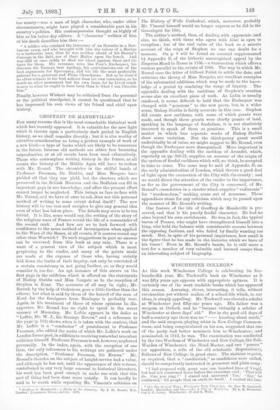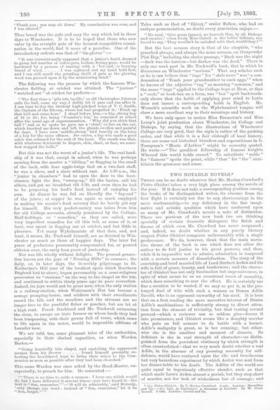WINCHESTER COLLEGE.* As this week Winchester College is celebrating its
five- hundredth year, Mr. Tuckwell's book on Winchester as it was fifty years ago appears with appropriate aptness. It is certainly one of the most readable books which has appeared this season. Amusing, clever, interesting, it tells, without
extenuation yet without malice, of a school-life which, to our ideas, is simply appalling. Mr. Tuckwell was elected a scholar
at Winchester just fifty-one years ago. His father was a surgeon at Oxford, and he "became virtually a scholar of Winchester at three days' old." For in the good old days of half.a-century ago there was no — humbug about merit," and the said surgeon, playing whist in New College Common-
room, and being congratulated on his son, suggested that one of the party had better nominate him to Winchester ; and nominated, in 1842, he was. The examination was conducted by the two Wardens of Winchester and New College, the Sub- Warden of Winchester, the Head-Master, and two "posers " (or appositors, a relic of the old scholastic disputations), Fellows of New College, in great state, The statutes require, or required, that a "candlestick," as candidates were called,
should be competently instructed in grammar and plain-song :
"I had prepared with great care one hundred lines of Virgil, but had not construed three before the examiner said : That will do. Can you sing P ' I stared and answered Yes.' Say,' be continued,' All people that on earth do dwell,' I recited the line, )1.) Andamt Way:: Wine/i081.CP IOU rears Ago. By nor. W. Tuekwoll. London : Macmillan and Co,---LC.) A Gay Meinerim By A. A„Brameton
and A. C. Leroy. 'Winch:eater : P. and C+. Wens.
Thank you; you may sit down.' My examination was over, and I was elected.
Thus broad was the gate and easy the way which led in those days to Winchester. It is to be hoped that those who now enter by the straight gate of the keenest competitive exami- nation in the world, find it more of a paradise. One of the introductory ordeals was that of " tin-gloves
"It was conventionally supposed that a junior's hand, doomed to grasp hot handles of coffee-pots, boilers, frying-pans, would be hardened by a process of searing with a hot-end,' or burning brand of wood I was captured and my hand held fast, and I can still recall the grinding thrill of pain as the glowing wood was pressed upon it by the ministering fiend."
The following was the process by which the famous Win- chester fielding at cricket was attained. The "juniors" " watched out " at cricket for prefects :—
" The first time a 'pile iota bacillo,' as old Christopher Johnson calls the ball, came my way,I deftly let it pass and ran after it. I can hear to-day the strident high-pitched voice of V. C. Smith, the Captain of the Eleven, whose bat had propelled it ' Fetch up that ball and come here.' I stood before him,—a big, strong boy of 19 or 20 ; for, being Founder's kin,' he remained at school after the usual age of superannuation. Why did you shirk that ball ?' and as he spoke ho gave me a clout,' or box on the ear, which knocked me down and left the glands swollen and painful for days. I have seen 'middle-stump' laid heavily on the loins of a boy for the same offence. Per contra, a fag who made a good catch was released for the rest of the hour. The result was that, with whatever detriment to fingers, skin, chest, or face, we some- how stopped the balls."
But this was not the worst of a junior's life. The real hard. ship of it was that, except in school, when he was perhaps earning from the master a " bibling," or flogging in the small of the back, with four apple-twigs tied on a two-feet staff, he was a slave, and a slave without rest. At 5.30 a.m., the "junior in chambers" had to open the door to the boot- cleaner, light the fire, "sweep-up," fill the basins, call his elders, and get no breakfast till 8.30, and even then he had to be preparing his lord's food instead of enjoying his own. At dinner he was fed on literally the " fag-end " of the joints ; at supper be was again so much employed in making his master's food savoury that he barely got any for himself. His very pocket-money was taken from him for old College servants, already pensioned by the College. Half-holidays, or " remedies," as they are called, were very imperfect remedies for all this toil, as some of it, at least, was spent in fagging out at cricket, and but little in pleasure. Yet many Wykehamists of that date, and, not least, it seems, Mr. Tuck well himself, are as devoted to Win- chester as much as those of happier days. The later fat years of prefecture presumably compensated for, or poured oblivion over, the early lean years of juniorship.
Nor was life wholly without delights. The present genera- tion knows not the joys of "Evening Hills" in summer ; the daily, or, in later days, the bi-weekly pilgrimage to St. Katharine's Hill (one of the loveliest spots which Southern England had to show), begun presumably as a semi-religious procession to " stations " on the way to the chapel on the top, and continued to within thirty years ago- its pure recreation. Indeed, its joys would not be great now, when the only station is a railway-station, when Waterman's Hut has become a sewage pumping-house, and soldiers with their sweethearts crowd the hill, and the meadows and the streams are no longer free to the youthful fisher or poacher, but are let at a high rent. Frank Buckland and Mr. Tuckwell swimming the river, to escape an irate farmer on whose lands they had been trespassing, with their gowns full of trout, which came to life again in the water, would be impossible editions of Leander now.
We are told, too, some pleasant tales of the authorities, especially in their clerical capacities, as when Warden Barter,— "Going hurriedly into chapel, and snatching the uppermost sermon from his drawer found himself presently ex- horting the bewildered boys to bring their wives to the Com- munion as soon as possible after they had been churched."
This same Warden was once asked by the Head-Master, un- expectedly, to preach for him. He consented :- "' There is no time to write a sermon : I have one which would do, but I have delivered it several times—you have hoard it—the text is " Son, remember." It will do admirably,' said Moberly, only change one word : instead of " Son, remember," let it be " Son, forget."'"
Tales such as that of " Skizzy," senior Fellow, who had an antique pronunciation, no doubt every generation enjoys :—
" He read, `Give grass (grace), we beseech thee, to all Bishops and curates when lively Miss Gabell in the ladies' tribune, was heard to say, They wouldn't be satisfied with that, would they P'"
But the best sermon story is that of the chaplain, "who preached always, and always the same sermon, on Gunpowder Plot Day," including the choice passage, "Dark was the night —dark was the lantern—but darker was the deed," There is only one weak part in Mr. Tuckwell's book, that in which he discourses on Winchester "notions." That any scholar such as he is can believe that "tugs " for " stale news " was " a con- densation of Teach your grandmother to suck eggs," when he knows of the adjective "tug" as meaning "common," and the name " tugs " applied to the College boys at Eton, or that " scob," or book-box on a form, was " box" spelt backwards. only shows that the habit of applying your mind to Latin does not insure a corresponding habit in English. Mr. Wrench's scientific work on the Wykehamical tongue will show a more excellent way to their meanings and history.
We have only space to notice Miss Bramston's and Miss Leroy's joint production about Winchester, its College and Bishops, by saying that the illustrations of Winchester College are very good, that the style is rather of the gushing order, and that while it is a fair rechauffe of local history, there are some sad historical blunders and superstitions in it. Tennyson's " Morte d'Arthur " might be correctly quoted. He wrote :—" The goodliest fellowship of famous knights Whereof this world holds record." To substitute " noble " for " famous " spoils the point, while "that" for "the" anni- hilates the grammar and sense.



































 Previous page
Previous page